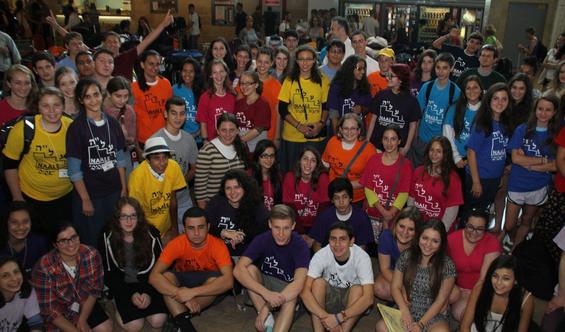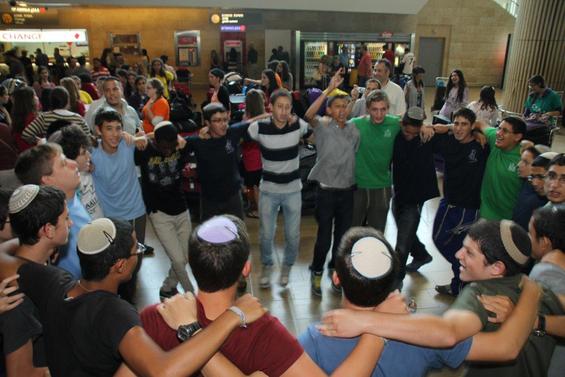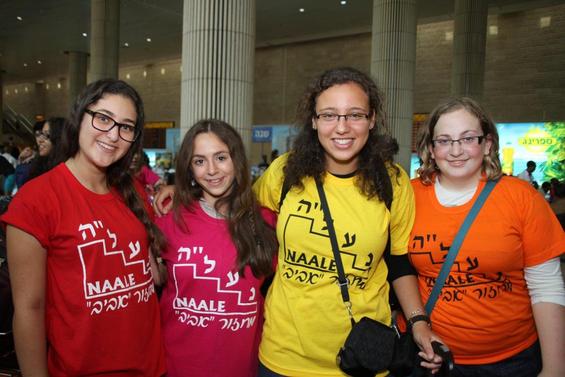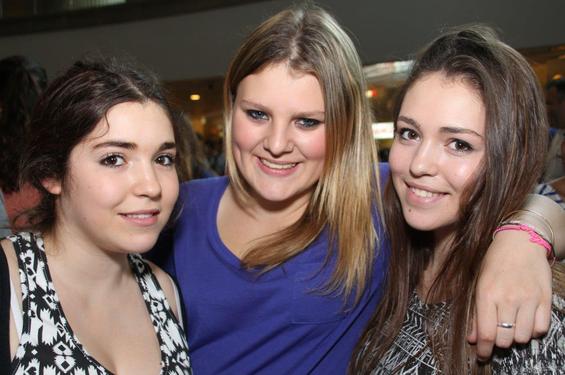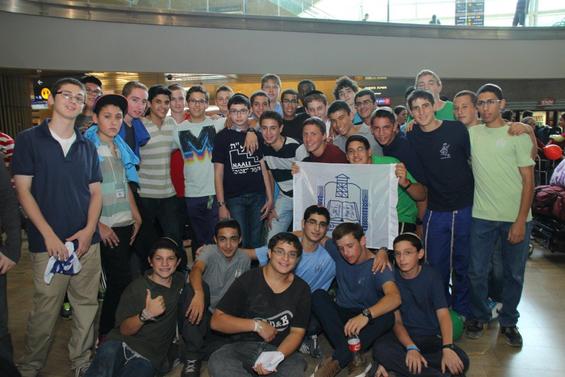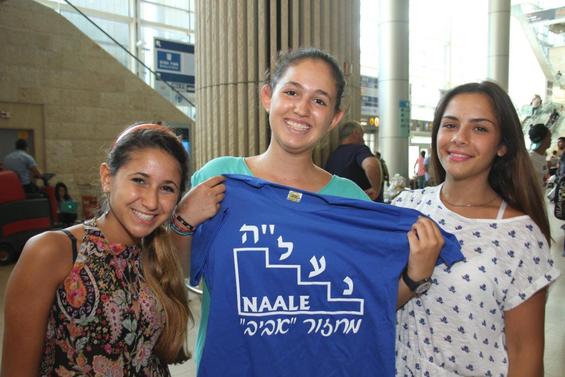About 190 youngsters from 26 countries on five continents recently landed in Israel to start the new year with Naale Elite Academy, a unique, exclusive, top quality Israeli high school program for Diaspora Jews.
The Naale Elite Academy program increases in popularity each year and more and more young Jewish teenagers are deciding to finish school inIsraelrather than stay with what’s familiar to them. The majority of this year’s intake arrived in time to celebrate the Jewish holidays at their respective schools.
Once again, the numbers from the US topped the list at 91, followed by France at 19 and Canada at 14. Other countries represented included Italy (9), Brazil (8), Mexico (7), South Africa (7), the UK (6), Germany (5), Spain (4), Argentina (3), Chile (1), Colombia (1), El Salvador (1), Uruguay (1), Venezuela (1), China (1), Japan (1), India (1), Belgium (1), Bulgaria (1), Denmark (1), Holland (1), Serbia (1), Switzerland (1) and Kenya (1).
New intake of Naale students arrive in Israel excited to start their new experience
“This is a nice increase in numbers since last year,” says Naale director, Yeshayahu Yechieli, who was at Ben Gurion Airport with his staff and the international Naale representatives to welcome all the students. “Since Naale Elite Academy opened its doors to the West about 12 years ago, we have welcomed students from 40 Western countries. This year, for the first time, we have a student from Japan. And countries like India, Serbia, Kenya and China are also represented, so we have a wide mix of students from all over the world.”
Naale Elite Academy enables young Jews from the Diaspora to complete their last three or four years of high school in Israel. The program integrates these teenagers into various high schools around the country, ranging from coeducational to Religious Orthodox and Haredi. A boarding school experience with a difference, Naale enables young Jews to study at an exclusive, top quality academy while learning to be independent, self-sufficient and resilient—in the international melting pot that is Israel.
Boys from Sha’alavim Religious Boys School celebrate their arrival in Israel through song and dance
The program was established in 1992 as a joint initiative of the Prime Minister’s Office and the Ministry of Education. Its mission is to enable Jewish high school students worldwide to study and to finish high school in Israel. The first 10 years focused on bringing youth from the FSU to Israel, but 12 years ago, Naale Elite Academy opened its program to the West, step-by-step, including English-, French-, German- and Spanish-speaking countries.
Since the program launched, more than 12,000 select high school students from the United States, Europe, the FSU, South America, Germany, Poland and South Africa, among others, have graduated through the program, a unique three-year scholarship program co-funded by the State of Israel (the Israeli Ministry of Education) and the Jewish Agency for Israel.
A new and different challenge
Divya Horesh (16) from Kansas, US, comes from a family that has been home-schooled. She understands that there are going to be huge differences between Naale and her own experience so far, but she’s up for the challenge and very excited.
“I’m looking forward to being more independent,” she says. “I’ve been home-schooled my entire life and it’s hard to be socially out of the loop. When you’re home-schooled, you don’t have any class mates and you don’t spend much time away from your parents.”
She felt it was time to do something different and after seeing a flyer at a NCSY youth event, decided to try Amanah Religious Girls’ School in Kfar Saba, north of Tel Aviv.
(L-R): Raquel Bendayan (15) from Montreal, Canada; Rochel Wolf (15) from Chicago; Salome Rivka Bouskila (16) from Montreal, Canada; and Divya Horesh (16) from Kansas, US
Yechieli doesn’t believe there will be problems for Horesh in adjusting to this new experience. “When a young person comes from one country to another (for Naale), it’s such a big change from so many different aspects, so for her, for example, instead of four changes, she will have five,” he says.
“I believe that if she, like other new Naale students, decided to come, and her family encouraged her, they understand that the whole system is different. We are happy to take her because we know that she can do it—in terms of potential and in terms of daily learning life—even if she comes from home schooling. We haven’t faced problems with home-schooled children in the past so I’m sure she’ll be ok.”
Sisters Maria (16) and Elizabeth (15) Gutkin (16) from Port Elizabeth, South Africa, decided to come on the Naale program together. They will both attend Mosenson, a co-educational school in Hod Hasharon.
“I found out about Naale the year before last,” says Maria. “I had been through the interview process and was then accepted to a religious girl’s school. But I wasn’t ready for that so I thought I would try again the next year. Then I heard about the coed school, Mosenson, and I thought, cool, let me give it a go. I’m ready this year. I need a good education if I want to maybe become a doctor and it’s a different opportunity here. I get to learn another language and meet people from all over the world. Look around. We’re surrounded by people from everywhere! It’s really cool,” she says.
(L-R): South Africans: Ami Fleisher, 16, from Johannesburg, and sisters, Maria, 16, and Elizabeth, 15, Gutkin from Port Elizabeth
“I found out about Naale at the same time as my sister and I thought it would be a really amazing experience,” says Ellizabeth. “It felt like something I wouldn’t regret for my future and it would be an incredible journey. My Dad was quite excited. He wanted us to go. He wanted us to live a different life, a more free life where we don’t have to depend on others for everything, so he was very excited for us. I think my Dad wants to make Aliyah eventually.”
A decision that secured Naale’s future
Yechieli reminisced about the history of Naale and mentioned the second cycle of Naale students who arrived in 1993. “Prime Minister Yitzhak Rabin (z”l) came to the airport and saw, in one shot, 750 children with very, very little luggage, and very, very strange clothing, like the old Russian style my grandfather wore in a picture I had from when he was 14.
“Today, everyone comes with his smart phone or laptop and everything is completely different from those days. But the main issue about Naale students is that everyone is the same: a child, around 15 years old, coming to Israel without parents and starting a new paragraph in his or her story.”
New and old Naale students from Sha’alavim Religious Boys’ School
The success of the Naale Elite Academy was summed up by Rabin when he said: “There is no more noble enterprise than Naale.” But it could’ve had a very different outcome. Rabin made two big decisions about Naale, which affected its future.
“In 1994, Prime Minister Rabin made the decision to transfer the control of Naale from the government to the Jewish Agency. Completely. The whole thing. And all of us went home,” says Yechieli. “A year later—it was November 1, 1995, three days before his assassination—he decided to bring it back. He realized that he had made a mistake and the government should be responsible for Naale, not the Jewish Agency. Not because there was something wrong with the Jewish Agency, but he felt that such a program, with a vision like Naale should not depend on fundraising; it should be a part of the State budget.
“He believed that once you take a child of 14 or 15 years old and you promise to take care of him until the age of 21 when he finishes the army, you can’t say after two years: ‘Sorry, I have no budget.’ And he understood that it was a mistake, so he took the whole of Naale back into the government, and then we all came back, myself and all my staff. We all had different jobs and we left everything and came back to Naale. Three of the original staff members are still here, including me. Had he not changed his mind when he did, who knows what would’ve happened to the program!”
(L-R): Students from Rome, Italy: Joelle Sara Habib (16), Yael Sed (15) and Camilla Terracina (15)
Thousands of Naale graduates from all over the Jewish world went on to higher education inIsrael, became Israeli citizens and have helped to build up the country in various fields. They have brought their culture, background, experience and education to the people and the State of Israel, leaving their mark on a country that welcomes Jews from every corner of the world.
This post has been contributed by a third party. The opinions, facts and any media content are presented solely by the author, and JewishBoston assumes no responsibility for them. Want to add your voice to the conversation? Publish your own post here. MORE

